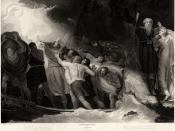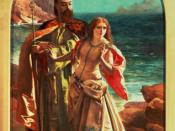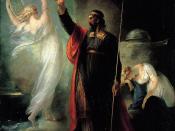To What Extent is The Tempest a Play About the Power of the Theatre?
There can be no doubt that The Tempest contains numerous references to the theater, and while many of Shakespeare's plays make reference to the dramatic arts and their analogy to real life (e.g., "all the world's a stage"), it is in this, his last play, that the Bard most explicitly acknowledges that the audience is viewing a show. Thus, in the play's final scene Prospero tells his prospective son-in-law Ferdinand that the revels at hand are almost at an end, that the actors are about to retire, and that the "insubstantial pageant" of which he has been a part has reached its conclusion. It is, in fact, tempting to equate the character of Prospero with that of his creator, the playwright Shakespeare. When Prospero sheds his magician's robes in favor of his civilian attire as the Duke of Milan, with the benefit of hindsight that this is Shakespeare's last work and his crowning achievement, we are disposed to associate the learned sorcerer with the Bard of Avon.
.
Prospero, like Shakespeare , is a mature man with a daughter (Shakespeare having two daughters) at the height of his intellectual and creative powers. Prospero is a polymath, a scholar with a magic book from an entire library that so absorbed him that it was, "dukedom large enough" (I, ii. l.110). Prospero displays a tinge of regret for having neglected his worldly office as Duke of Milan in favor of the life of the mind. Similarly, as virtually all of Shakespeare's biographers have observed, the Elizabethan playwright's knowledge was exceedingly broad, leading many to speculate that he pursued a number of vocations before settling into a life in the theater, and we know from textual correspondences that...


